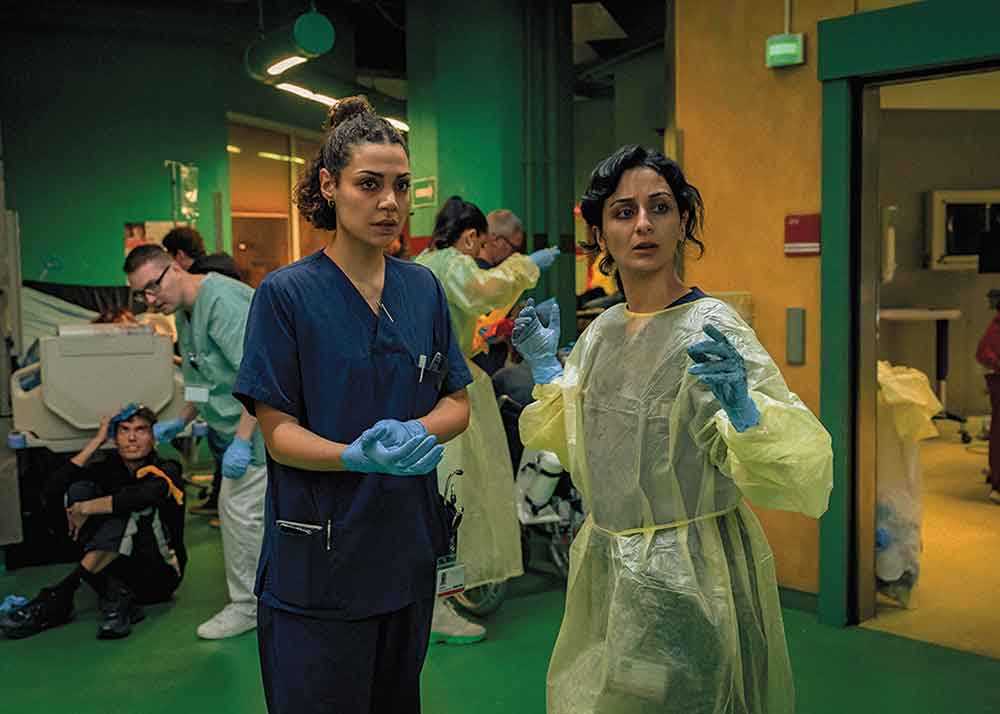Berlin ER explores the life-or-death drama inside a hospital emergency room
From the opening moments of the drama series Berlin ER, it is clear this is not a hospital where you get treated if you have a choice. New chief doctor Suzanna Parker (Haley Louise Jones) arrives at Krankenhaus, the most overcrowded and underfunded hospital in Berlin, where she is immediately met with insurmountable obstacles: a substantial lack of resources and a persistent resistance from the staff, who are all thinking, “Another week, another boss.” But Zanna, who is starting anew after her personal and professional life in Munich implodes, is there to stay.

One might hope the gritty series is an exaggeration of European healthcare woes, but it was in part inspired by series creator Samuel Jefferson’s experience as an emergency physician in London. “It was a really, really tough job,” he says. “The actual job of being a doctor, of helping someone, of understanding the body, is glorious. But when you’re put in a situation where you don’t have enough resources to be the doctor you want to be, or to reflect on the trauma that you’ve had from seeing those [patients], it’s really tricky to balance.”

It was TV shows like ER, Scrubs and Nip/Tuck that inspired Jefferson to attend medical school. He now admits they gave a somewhat skewed impression of the profession. “Looking back, I had a very glamourized view of what it was to be a doctor,” he says. “Med school was similar. You’re the best of the best. And then, when you start work, you were at the bottom of the bottom and it’s tough.” His goal with Berlin ER is not to put people off becoming doctors, but to have a conversation about the reality of the profession. “When you send soldiers to war, there’s an acknowledgement that it must be really stressful. ‘We need to talk to you afterwards.’ Sometimes being a doctor is going to war every day, but people don’t treat you like a soldier returning from it.”

At “Krank,” the challenges are hitting Zanna from every angle, as she tries to lead an exhausted staff who have developed destructive ways of coping. Emergency doctor Ben (Slavko Popadic), in particular, is determined to test her patience, both inadvertently and intentionally. “Ben is driven by his passion to help, but his passion is the thing that destroys him,” says Popadic. “He’s a brilliant surgeon. On the other hand, he’s really self-destructive — weak and strong at the same time. It’s a moral journey you go on with Ben.”

And before Zanna can manage her staff, she needs to simply be heard — a fairly universal experience among young people and women in positions of power. “Zanna is very relatable, a woman in her mid-30s trying to reach her ambitions as a doctor and as a woman in a leadership position. I think it’s very, very important to take the question seriously: Why do I have to get loud for you to hear me?” ponders Jones. “I fully understand [the situation], and it resonated so much with me, exploring that. I hope that women and young girls are going to see her, recognize themselves in her, and feel permission to take up space and to have a voice.”

As the series progresses, it is Ben and Zanna who form the unlikely nucleus of the series — a relationship that you can either fear or root for. “I think they both have coping mechanisms that are unhealthy,” says Jefferson. “Ben’s are more obvious, but I think Zanna sees in Ben a reflection of herself. Zanna has an obsession to get things right and to be seen as confident. It’s very hard for her to admit that she needs help. It’s also very hard for Ben to admit that he needs help. I had someone say, ‘I don’t know how I feel about Ben and Zanna. I want them to be together, but I think they’d be really toxic and awful.’ And I was like, ‘Perfect. That’s exactly how I want you to feel.’”
For the most part, the series takes place within these hospital walls, where the private lives of the doctors bleed into their work. Jefferson initially played with inserting scenes from outside “Krank” but found them superfluous. “Severance doesn’t exist in the medical world, so we didn’t need to go home with them. There’s no escape from it,” he says. “And when they go outside, the rare chances that they do, they take everything with them.” Although the show might read as a judgement on healthcare, it is meant more as a starting point for conversation. “[I hope] it makes someone that runs a hospital or a company think, ‘Maybe we need to support our doctors or nurses more,’” he says. “If the job was kinder and they had more time and more support, a lot of the problems that they face in themselves wouldn’t be so extreme.”
Berlin ER premieres on Wednesday,February 26, on Apple TV+
